The first woman to anchor a world heavyweight boxing championship has, in many ways, been fighting her whole life. The award winning broadcaster speaks about growing up in domestic violence, surviving sexual abuse, finding Christ – and the near-death experience that reorientated her life
Detailing all that Charlie Webster has achieved and experienced could take the entire word count of this article. “I feel like I’ve lived at least four lives!” she laughs at the start of our interview. The 43-year-old’s overwhelmingly impressive CV includes hard-won successes in the heavily male-dominated world of sports journalism, covering football, motorsport, boxing, triathlon and the Olympics. She has worked for ESPN, Sky Sports, ITV and the BBC and, in 2014, became the first female presenter of a world title boxing match – despite being previously told that the audience “weren’t ready” to accept such radical gender equality.
But sport is not just something that Webster talks about. A keen boxer, footballer and teenage athlete, she has run more than 16 marathons and completed three Ironmans. At her first triathlon – London in 2013 – she was not only part of Channel 4’s presenting team, but also competed in the event, too (the YouTube footage is truly remarkable). She has also undertaken a dizzying array of endurance challenges, including a 3,000-mile charity bike ride from London to Rio de Janeiro, Brazil.
This last feat concluded shortly before she was due to cover the 2016 Olympic Games in the city – but instead, Webster contracted a rare form of malaria and was hospitalised in Rio. She was in a coma for more than two weeks and, at one point, given just 24 hours to live. As her fight for survival made headlines around the world, the church community she had recently joined in London galvanised in prayer. During that period, Webster had a near-death experience (which became the inspiration for her podcast series ‘Died and Survived’) and at her lowest point, saw an angel. That she eventually made a “miraculous” recovery was, in no small part, due to her newfound Christian faith and the prayers of her fellow believers, she says.
Born to a mother who was just 16, Webster witnessed domestic violence in the home and was herself “abused in every way”. As a teen, athletics became her escape, but her coach preyed on Webster’s vulnerability and sexually abused her and several other members of the squad. In 2002, he was sentenced to ten years in prison. Webster was just 19.
I can tell stories that have impact, and that comes from being able to understand what trauma, pain and adversity are like
Instead of letting these experiences derail her, Webster used them to fuel the fire of her ambition. She has interviewed stars including Sylvester Stallone, Arnold Schwarzenegger and David Beckham. Her 2021 critically acclaimed documentary, Nowhere to Run: Abused by our coach led to a change in UK law. She has written, presented and produced award-winning podcasts including ‘Scamanda’ and the recently released ‘Unicorn Girl’. She is also a prolific campaigner for charitable causes including domestic violence, sexual abuse and cancer research.
Webster is proud of all that she has achieved – and survived. Yet she’s aware that her coping mechanisms haven’t always been the healthiest. It was a “difficult time” in her life that first led her to church. Now, her faith gives her purpose and holds her steady. “It’s a really nice place to be in. Sometimes I’m like: ‘Wow, I actually did everything I set out to do.’ That’s kind of cool.”
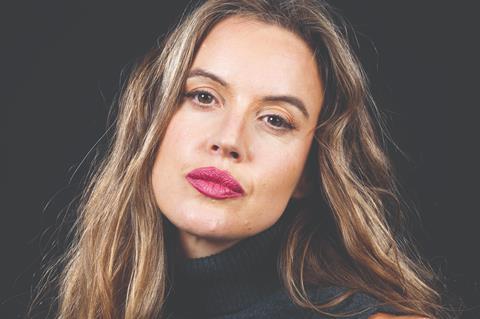
Could you tell us about your faith journey?
Have we got several days? It’s a long one! I was not raised in a religious household. In fact, it was quite the opposite. My stepdad wouldn’t let me go to the local youth club because it was in a church and had a faith element.
But I always used to pray to God. My home life was difficult, so I used to pray for things to change, or for my mum to be OK. I felt connected in some way, not necessarily to the Bible or to Jesus, but definitely to my own belief in God. Then, in my early 30s, I walked into a church for the first time. I had been once or twice for a wedding or an event, but I’d never really been to a service. I was really uncomfortable. I didn‘t like it at all. There were lots of people singing, everyone was joyous and I felt the opposite.
I was going through a difficult time, and I’d heard about this church – Holy Trinity Brompton (HTB) in London – through some friends. I went a couple of times – never sang, never spoke to anyone – then they started talking about the Alpha course. I’m very curious, so I went along. I liked the intellectual side of it: you get to debate and question things, which I love. As we went through scripture and talked about what it meant, I felt like I already knew it. It was what I lived by. One of the pastors gave me a Bible. I’m quite studious, so I went away and read the entire thing. I felt so connected with it.
That was around June 2016. [Not long after] I did a charity cycle ride from London to Rio. I finished the ride, but I ended up in a coma, on a life support machine. I was given 24 hours to live. My mum was told that I was dying, and she should get on a plane to Rio ASAP. It was horrific.
This woman came and sat by my bed and prayed. She was connected somehow to the church in London [HTB] that I had started going to earlier that year. The doctors didn’t know what was wrong with me at that point [they later diagnosed a rare form of malaria] and she was pregnant. I remember thinking: What are you doing here? Why are you taking this risk to sit next to me? but I could hardly speak.
I nearly lost my life, and people all over the world prayed for me, led by the church I’d just started going to. I feel like I was meant to step into that church community – and that community helped me recover. My mum ended up divorcing her abusive husband and coming to stay with me, and she went to that church, and they helped her, too. So, it became this powerful story.
I feel like my faith saved my life.
Could you explain what was difficult about your home life?
I was raised in a domestic abuse household and abused as a child in every way. It was like walking on eggshells every day, being scared. I became hypervigilant, which is super unhealthy. Everything became about trying to limit the emotional, verbal and physical violence that we suffered.
I’ve campaigned so much about this because it has such a long-term impact, and I don’t think people understand that. The way I was raised informed how I saw myself – as not worthy, clearly not lovable because how could I be? Look at the way I’m treated. My mum is incredible, but because she was a victim of domestic abuse, she was not always present mentally and emotionally. I very much parented myself.
If a woman’s allowed to step into the boxing ring, why can’t a woman talk about it?
When I was eleven, I joined a running group, and I loved it so much. It was one of the few places I laughed – and I was good at it! But my running coach took advantage of that and groomed and sexually abused me. He used my own vulnerability and trauma against me, because I already had low self-worth and I really trusted him. I felt safe with him, and I believed he cared.
What’s difficult about the situation is that it was done in the guise of sport, like: This will make you a better runner. And I wanted to be better, because then maybe I would be worthy. It was all very conditional for me. Love was conditional. If I could win races, maybe things would change. I wanted to be an Olympian to save my mum, to change our lives.
My coach did get convicted and put in prison when I was about 19 years old. But it absolutely destroyed me.
Did you ever wonder why, if there was a God, all these bad things happened to you?
It’s an interesting question – and a very common argument. My life was very difficult. As a consequence of that, I had a lot of trauma and mental health issues.
I’ve taken a lot of strength from believing that I am worthy, and that my voice is valuable and a lot of that has been driven by discovering my connection with God. [Some might say]: “God could have prevented that”, but I don’t believe that’s God’s role. I believe God helped me survive.
From that, I did go on a journey, not just to connect more with faith, but also to deal with some of the unhealthy patterns of behaviour in my life. I believe God gives us the courage and strength to make those choices. I don’t believe life was meant to be all rosy, but I do believe I can change my life and be empowered to do that – and my connection with God helps inform those decisions.
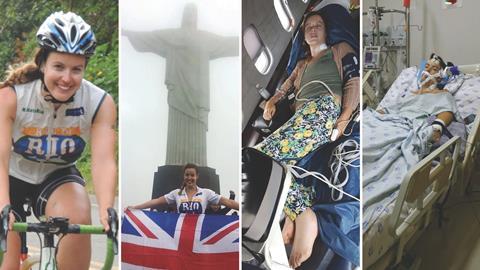
You have a phenomenally successful career, but you had to fight your way into sports broadcasting, which was very male-dominated at the time. How have things changed?
It’s changed exponentially. I’m not saying everything is fine now, because there’s still a pay gap and there’s still sexist abuse, but we have to remember that it’s a very new thing still.
I’m from a very underprivileged background. No money, no contacts, I’m the first person in my family to go to university. I used to think that I didn’t belong in the industry because it was all people with privilege – but then I realised that was my superpower. I can tell stories that have impact, and that comes from being able to understand what trauma and pain and adversity are like. I can see things not just from a journalistic point of view, but from an emotional one too. I can hold space for people.
I wanted to be an Olympian, but sport wasn’t a pathway when I was a young girl. I loved football, but there was not really a professional route. There was no pathway in broadcasting, either. I just literally barged my way in, and I was treated horribly the majority of the time.
I was one of the main presenters on Sky Sports News, and I said to the head of the network that I’d like to join the boxing team. I got laughed at. It was: “The audience isn’t ready for that.” The conversation was actually far more derogatory – but it was basically: A woman can’t speak about boxing and women can’t box. It was like a red rag to a bull.
When it was announced that women would box in the 2012 Olympics, I went back to him. I knew some of those boxers because they’d been around the gyms that I’d been around. So that’s how I managed to get into it. Because if a woman’s allowed to step into the ring, why can’t a woman talk about it? I did get a bit of crap to start with but then, very quickly, the boxing community realised I knew what I was talking about, and I was welcomed.
I could tell you a million stories like that. But when I was in those environments with all those men, I was like: Oh, well, I’ve seen you all before, because I was raised with a narcissist. So, I was a bit like: Whatever you do or say to me is nowhere near as bad as what I was raised in.
When I got to a position where I could say “No”, I found my voice and began to stick up for myself. But it was very hard, because these people have so much power. There was a lot of sexual harassment, and when you say “no”, they try to ruin your career, to take you off shows or stop you getting on shows. It’s an old boys’ club, and they could shut you down in seconds.
Are you saying you’ve got personal experience of the worst of the #MeToo movement?
Ten times over. Yes. Absolutely.
I remember being shouted at, literally destroyed in an office by the head of a network because I’d spoken out about domestic abuse on the BBC news show This Week. The next day, it was like: “Who do you think you are? Nobody gives a **** what you think. Get back in your box, look pretty and talk about sport…”
Because they felt what you said was bad for the image of the show you were presenting?
I think they felt it was a threat, because I was getting attention. I was in the newspaper the next day – it was thrown at me. This person used to call me ‘the enigma’ because they couldn’t quite work me out, or break me. It’s a very similar mechanism in domestic abuse – if you break that person down, you’ll be able to control them.
I remember going to the toilet and crying – and then I had to go on air for five hours. But I was so determined not to let those people win.
How did you get through it? Were you a Christian at this point?
I probably wouldn’t have called myself a Christian, but I definitely had something inside me – a strength – and I think that came from faith in God. I always felt a presence, but if you’d asked me then, I probably would have said no. I was still fighting it!
I do have wobbles, but the foundation of my faith has never wavered
It was hard. I detached a lot – which is actually an unhealthy behaviour. It’s a coping mechanism, and it’s survival – and I’m so proud of myself and the things that I did to survive. But when you detach, you become hardened; it prevents love from coming in, and that’s something I’ve spent the last ten years working on. It made me depressed and lonely and isolated. I had such a strong shell on the outside, but my heart was breaking on the inside.
You are clearly incredibly driven – some of which comes from your life experiences and hasn’t always been entirely healthy. What impact did it make when you found faith eventually?
My faith has had a huge impact. Ending up in a coma and fighting for my life really stripped me down to the raw. Nothing else mattered – other than living, and the people that I love.
On my calf, I have a tattoo of an angel. I saw that angel [in Rio] and I got somebody to design it. At one point, I was in so much physical pain, and I was also exhausted by life, from constantly fighting. I’d had enough. It was only for a split second, and then I saw my mum, and all the people I love, and I saw this angel and God. I was like: I haven’t finished. I’m definitely meant to be here.
[Proverbs 31:8 talks about] being a voice for people that don’t have a voice. I feel like that’s why I’m here.
Life isn’t going to be roses all the time. I don’t like glossing over things, because it’s not reality. That’s not faith to me, that’s pretend. I do have wobbles and things do happen, but the foundation of my faith has never wavered, because I believe I’m meant to be here, and this is a position I’m meant to be in.
Feeling that God is with me gives me a safety I never had. No matter what, I’m going to be OK.
To hear the full interview listen to Premier Christian Radio at 8pm on Saturday 6 December or download ‘The Profile’ podcast premierchristianity.com/theprofile













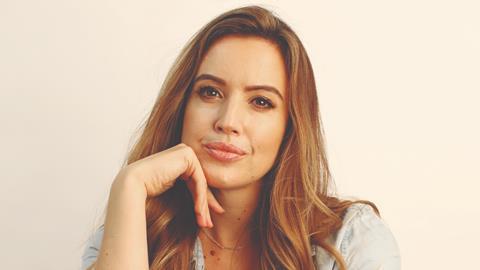

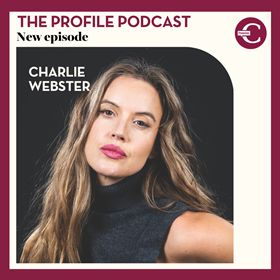
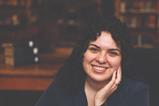























No comments yet